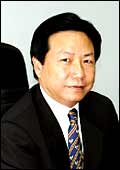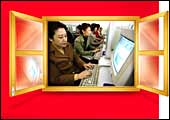|
I
had never heard of Neusoft before I came to China 36 months back,
but I have no problem believing Walter Fang when he declares,
not modestly, that "by 2010, Neusoft will be a household
name in the United States and Europe". One reason is that
Fang is a 27-year veteran of IBM, now the Group Vice President
and Chief Technology Officer of Neusoft, and he should know. The
other is that Neusoft is already China's largest outsourcing firm.
"If I were United States or Europe,
I should realise I am no longer the centre of the universe,"
says Jane Smith, the Senior Vice President of a $10 billion-plus
(Rs 44,000 crore-plus) financial services major with a growing
footprint in China. "And, if I were India, I should start
worrying (about competition from China in it services)."
Smith adds that the domestic it services market in China will
grow to "a significant size by world standards" soon.
"If one of the world's leading aerospace
firms can trust Ufida (with meeting their demanding requirements),
I am sure other clients can trust our capabilities," says
Guo XinPing, Vice Chairman of Ufida, formerly UF Soft and China's
largest software products firm (it is the leader in the enterprise
resource planning segment).
If Fang, Smith and Guo are to be believed
(and there is no reason to do otherwise), China is poised to become
both an attractive market and an outsourcing hub for it services.
A study by it research firm IDC puts the growth rate of the IT
services market in China at an average of 25 per cent a year.
Taking into account the rapid growth rates in other sectors of
the it industry (hardware, software), the country could become
the second-largest it market in the world after the us sometime
in the next decade. Several firms see China as the next big market
and have already established a significant presence in it; others
are scrambling to have a China strategy of their own more from
a desire to keep up with the Joneses than anything else. However,
both from the perspective of tapping the Chinese domestic market,
or from that of viewing the country as an outsourcing destination,
there are companies that are yet to decide on what to do. Many
of these have to do with the lack of information on China. Over
36 months, I sought to improve my understanding of the country
and its IT services market (and prowess). This article contains
some of my learnings.
 |
"If one of the
world's leading aerospace firms can trust Ufida (with meeting
their demanding requirements), I am sure other clients can
trust our capabilities"
Guo XinPing
Vice Chairman/Ufida |
The Outsourcing Challenge
MYTH: Outsourcing to China has
a long way to go
REALITY: By 2007, China will be
a 'competent' destination for outsourcing
All through 2001
and 2002 when India Inc. was being paranoid about the coming Chinese
Juggernaut, CEOs of it services firms, and media analysts couldn't
stop talking about the threat China posed to them. Then, by 2003,
the tenor of their arguments changed, perhaps a reflection of
larger geo-political sentiments, and they started speaking about
how it was no longer China or India, but China and India (Chinese
expertise in hardware and Indian in software would help the two
countries take on and take over the world, went the reasoning).
Over the past few months, Beijing has been sending directives
to local governments and Chinese companies to build economic relationships
with India and Indian companies.
Circa 2005, India has emerged the preferred
destination for the outsourcing of it services (in some measure,
thanks to the negative publicity the country received in the us
all through 2003 and part of 2004). However, I realised that the
Chinese are quietly working to build the capabilities required
to grab a higher share of the market.
 |
| Level playing field: The newer generation
of Chinese has access to same resources as, say, a teenager
in the US |
The English Equation: English, most people
continue to believe, is not spoken here. That may have been the
situation 10 years ago, but today the number (and quality) of
English-speaking Chinese is growing by the day. Indeed, this is
an area of focus for both individuals and the government and is
reflected in the number of English instructors from 'native-English-speaking-countries'
(the US, UK, Australia and New Zealand) floating around here.
Elsewhere in the world it would take a generation before one can
see the fruits of this effort, but if the track record of the
Chinese in other areas is any indication, they should be able
to cut this time to a half, even a third. I am told that in the
past, most people in this country studied English as a core subject.
The rigid nature of the study mandated memorisation, and coupled
with China's closed-system-it did not encourage contact with other
cultures-this resulted in a situation where most Chinese could
read English without really being able to speak it with any level
of comfort. Since the 1990s, however, things have changed; the
number of foreign companies (and foreigners) in China has increased
exponentially; and students of English have at hand a range of
learning resources they can tap to improve their speaking skills.
I have encountered young men and women who speak English perfectly,
with either American or British accents without ever having left
China.
 Several
travel agencies and banks in China (Ctrip, the largest online
travel agency and China Merchants Bank come to mind) boast call
centres staffed with English-speaking customer service agents
(they serve the English-speaking expatriate population in the
country). I have dealt with the two companies mentioned here and
discovered that there is tremendous improvement in the agents'
comprehension and speaking abilities, month on month. Several
travel agencies and banks in China (Ctrip, the largest online
travel agency and China Merchants Bank come to mind) boast call
centres staffed with English-speaking customer service agents
(they serve the English-speaking expatriate population in the
country). I have dealt with the two companies mentioned here and
discovered that there is tremendous improvement in the agents'
comprehension and speaking abilities, month on month.
As any company in the outsourcing business
knows, entire workforces need not be proficient in English; only
client-facing functions such as project management, design and
integration need to be; in terms of proportion that would translate
to about 30 per cent of the workforce. Most people in this country
believe that it will reach this magical number in the next five
years.
 |
"By 2010 Neusoft will
be a household name in the United States and Europe"
Walter Fang
Group Vice President & Chief Technology Officer/Neusoft |
Then, there's the growing market for the outsourcing
of non-voice business processes (non-voice BPO). Spoken English
is not a pre-requisite for providing services such as data processing;
people engaged in this business merely need to know to read and
write the language. Ufida's Guo understands this; China, he says,
has the requisite human resources to power BPO firms. That's an
understanding that is also dawning on multinationals such as GE
and Affiliated Computer Services that have invested in BPO operations
in the country. The government too is happy to encourage the growth
of this market; it could be a significant generator of employment
and has far less impact on the environment than manufacturing.
Some Japanese firms such as Sony and Panasonic have also been
quick to spot and tap this opportunity. Thanks to history, the
country has a sizeable number of people who speak Japanese or
Korean.
The Process Thing: If China is a global manufacturing
powerhouse, credit must go to the country's emphasis on formal
processes in this area. Unfortunately, that phenomenon is yet
to spread to it services. Chinese it services firms, customers
in the US and Europe believe, have processes lacking both in maturity
and rigour, things that are the hallmark of most successful Indian
it outsourcing vendors. These concerns are shared by Smith; however,
having witnessed the evolution of the Chinese software industry,
she is convinced that it is only a matter of time before companies
in this country show improvements in both.
As I write these words, China is going through
a CMM-craze of the kind India went through in the early 2000s
when every company in the business wanted a level four or level
five Capability Maturity Model (a model developed by Carnegie
Mellon to measure the maturity of the code-writing process) certification.
The government too is encouraging vendors to pursue a CMM-4 or
CMM-5 certification (this is actually a precondition in certain
government tenders).
Centrally-planned Economy? Well, Not
Quite
China's economic system falls
midway between a centrally-planned system and a no-holds-barred
capitalist one. |
 |
| Awry growth? Excess infrastructure
capacity is an issue |
The Chinese economy may have
been centrally planned 20 years ago; today, it is partly that
and partly free-market (well, almost). Most important industries,
however, are dominated by the state. The provinces, counties
and cities compete fiercely for foreign direct investment
(FDI). This has resulted in the mushrooming of special industrial
and economic zones and, consequently, excess capacity in terms
of infrastructure in some areas. The government has belatedly
recognised this and is restricting the growth of some such
zones. Local officials in cities and provinces wield enormous
power. They are subjected to annual performance reviews by
their bosses; much like executives in progressive companies,
they are judged on the basis of key performance indices. For
instance, local officials have to meet a target regarding
FDI. Those that do not are replaced. That's a meritocracy
of sorts. |
Processes, though, are not the only cause
for concern. The Chinese, it is widely believed, are not flexible
thinkers, largely a result of a rigid education system. That can
be a limiting factor while executing projects that involve uncertainty
and require brainstorming with clients and team members. Vendors
in the US and India will continue to maintain their lead in (and
dominate) these kind of projects. However, there are two trends
that are in favour of China as a significant outsourcing destination
for other projects. The first is the fact that technology has
become increasingly commoditised and processes have matured to
such an extent that the amount of critical (read: flexible) thinking
that goes into technology-implementations has decreased significantly.
The second is that the newer generation of Chinese is no longer
fettered to the past. It has access to the same resources as,
say, a teenager in the US. Its thinking and approach is certain
to be innovative and creative. It is this new generation that
is entering the workforce today.
The Booming Domestic
Market
MYTH: The domestic market for it
services is yet to reach critical mass
REALITY: Both industry and government
have wholeheartedly embraced it; this has resulted in a large
domestic market that can only grow
 |
| Courting China: Several firms see the
country as the next big market |
The appeal of
china's domestic market in areas such as cars and telecommunications
is well known. What isn't is the fact that things are no different
for it services. Neusoft's Fang points out that the Chinese it
services industry derives 90 per cent of its business from the
domestic industry and 10 per cent from outsourcing. In India,
as everyone knows, things are the exact opposite.
Motivated by a desire to improve efficiencies,
manufacturing firms in China (both domestic and multinational)
are in the midst of an ERP (enterprise resource planning) wave.
Ufida, for instance, derives the bulk of its revenues from the
sale of ERP software to the local manufacturing sector. Then,
there's the move by companies across sectors to focus on value-added
services. Chinese telcos, says Fang, are focussing their efforts
on increasing revenues and average revenue per user (ARPU); they
propose to do this by offering value-added services; these services
require investments in it; and, consequently, there is an increased
demand for it services. A similar thing is happening in the financial
services industry with the imminent entry of multinationals-according
to the terms the country signed at the time of its entry into
the WTO, China's financial services industry will be open to foreign
players from 2006-providing an added incentive for local companies
to strengthen their own it systems.
| Chinese Truths |
The joint venture thing
Forging a joint venture (JV) with a local Chinese firm is
not for the faint-hearted. Even in developed markets such
as the United States and Europe, JVs fail more often than
they succeed. In China, the natural mortality rate of JVs
is increased by complexities such as cultural and linguistic
barriers, differences in business environments and the evolving
nature of the market economy. In the IT services space, a
JV between a foreign firm and a local one only makes sense
if the two bring complementary strengths to the marketplace.
For instance, the former can contribute capital and technology
and the latter, local expertise and selling and distribution
expertise.
Soldiers are fine, but where are the
commanders?
There is no shortage of software developers in China: Universities
churn out a lot of eager engineers ready to make their mark
in the IT services industry. What China lacks is the middle-and
senior-management essential to take on large complex projects.
There are very few senior executives in China with adequate
experience (read: 15-years-plus) in the IT services industry.
There are plenty of overseas Chinese in the US. However,
there are two issues with this talent pool: overseas Chinese
expect to earn the same they did in the US back home in
China; and most boast an experience of just five to six
years, good enough for the post of a project leader or a
project manager, but nothing more senior.
Please fund me
Good Chinese IT services firms lack the financial resources
to expand. This is mostly due to the fact that China lacks
mature financial markets. It is difficult for a Chinese
IT firm to get funding from private or public sources to
grow. Given that IT services firms need to focus on scale
(as proved by the India story) this is a crippling constraint.
Currently, the IT services industry in China is highly fragmented,
with around 10,000 small firms. Few (if any) have more than
10,000 employees. In sharp contrast, even mid-sized Indian
IT services firms have more than 10,000 employees. The challenge
for China is how to build 100 large firms from the fragmented
industry. Some analysts believe that the Chinese IT services
space will witness frenzied M&A activity over the next
few years.
|
The foreign firms themselves will contribute
another revenue stream as they face the challenge of tailoring
their products and services to meet the unique demands of the
Chinese market. For instance, regulations governing insurance
offerings differ from province to province, even from city to
city within the same province; not many 'western' software products
can accommodate such requirements. Other sectors that will contribute
to the growth in the domestic market for it services include embedded
devices, energy, healthcare and government.
Whose IP Is It Anyway?
MYTH: Kiss your intellectual property
goodbye in China
REALITY: The situation is not very
different from other countries; taking simple precautions is the
key
China has earned the wrath of the
office of the United States Trade Representative (USTR) for gross
violations of intellectual property (IP) rights. However, Smith
believes that the situation in China is not very different from
that in other developing countries with IP problems. It is just
that IP violations in China happen openly and publicly.
The issue of IP in China has to be viewed
from a uniquely Chinese perspective; Western firms entering China
expecting an IP regime similar to that in their home countries
are bound to fail in protecting their IP. The Chinese law-enforcement
and legal system is complex and constantly evolving. At this stage
it makes sense for companies to focus on prevention rather than
enforcement. Some Japanese companies have successfully adopted
this method. They have created discrete processes for manufacturing
and outsource different pieces to different Chinese vendors. They
make it very difficult for anyone to copy their IP by assembling
the processes and technologies together. This method makes it
extremely difficult for anyone to reverse-engineer the product.
Companies such as Smith's follow a different approach. They do
acknowledge that their software could be out in the market as
pirated versions, but Smith explains that because the software
is so complex and requires as much customisation as it does, it
is very difficult for any counterfeiter to generate any long-term
value out of it.
Banking System: The Weak Link?
The current state of Chinese banks, unless
reformed, could bring the country's economy to a grinding
halt. |
| If there is one
thing that can bring the hyper-activity in china to a halt,
it is the wobbly state of the country's banking system. The
country's banks are carrying non-performing loans that account
for almost 40 per cent of their assets. The core problem is
that local politicians in cities and provinces across China
control the levers of loan issuance. The result has been gross
misallocation of financial resources on unproductive activities
or on activities that produce market-distorting oversupply.
The government recognises this problem and is trying its best
to clean up the banking sector. One approach is the creation
of asset reconstruction companies that take over bad debts
and, in turn, sell them at a discount. Another is to attract
equity participation in Chinese banks from foreign banks (this
will have the same effect as recapitalisation). And yet another
is the government's effort to get leading Chinese banks to
list on US stock markets, in the hope that this will force
them to adopt better risk management and governance practices. |
Several firms fail to take basic precautions
such as registering their trademarks. And some believe the IP
enforcement mechanism will ensure they are safe-not a good strategy
in China. Then, foreign firms would do well to develop localised
pricing strategies for China, as indeed media giants such as AOL
Time Warner have done recently. One of the key steps in precautions
is to build up relationships with local authorities; I understand
that Chinese authorities act on IP theft if they see the "unfairness"
of it all.
Today, I know more about China and its IT
services market than I did before coming to the country. However,
it would be foolish on my part to expect this to translate into
immediate gains for any company. There's no denying the opportunities
China presents as a destination for outsourced it and business
process services. However, to succeed, a company will have to
have the right China strategy and display a long-term commitment
to the market.
The opinions expressed here
are of the author and do not represent those of iGATE
|







 Several
travel agencies and banks in China (Ctrip, the largest online
travel agency and China Merchants Bank come to mind) boast call
centres staffed with English-speaking customer service agents
(they serve the English-speaking expatriate population in the
country). I have dealt with the two companies mentioned here and
discovered that there is tremendous improvement in the agents'
comprehension and speaking abilities, month on month.
Several
travel agencies and banks in China (Ctrip, the largest online
travel agency and China Merchants Bank come to mind) boast call
centres staffed with English-speaking customer service agents
(they serve the English-speaking expatriate population in the
country). I have dealt with the two companies mentioned here and
discovered that there is tremendous improvement in the agents'
comprehension and speaking abilities, month on month.

